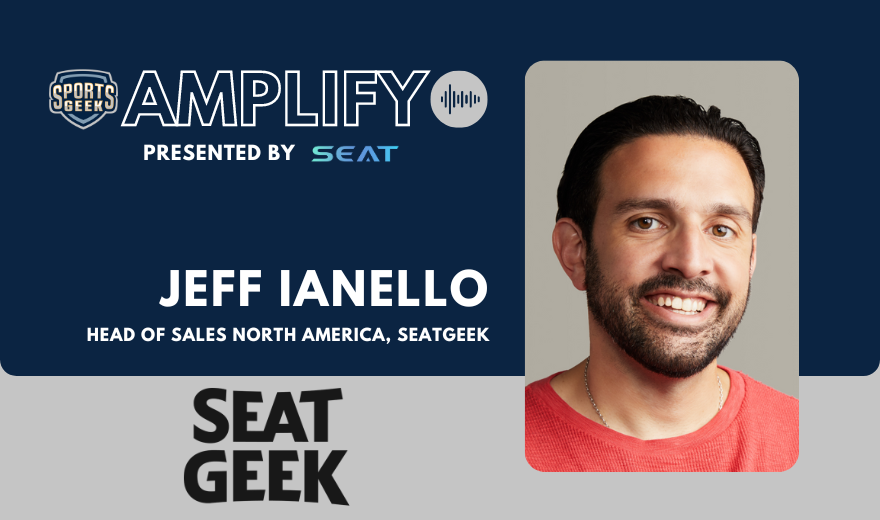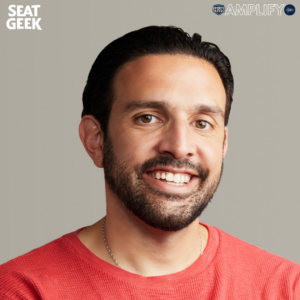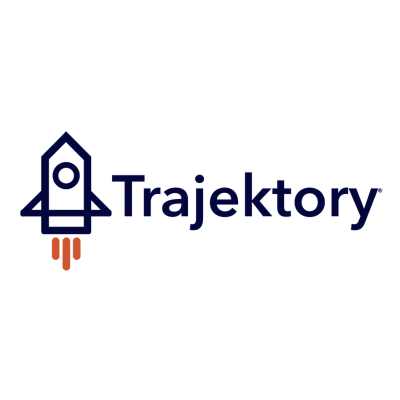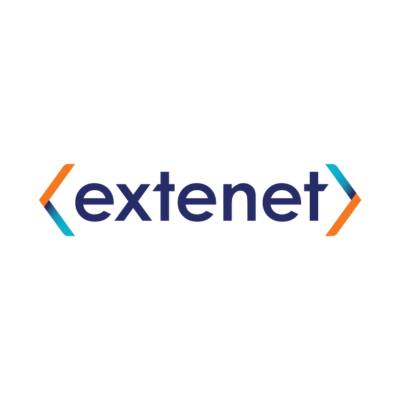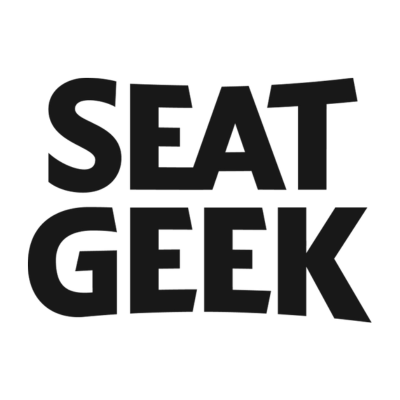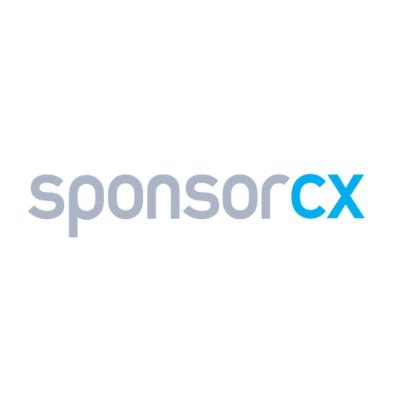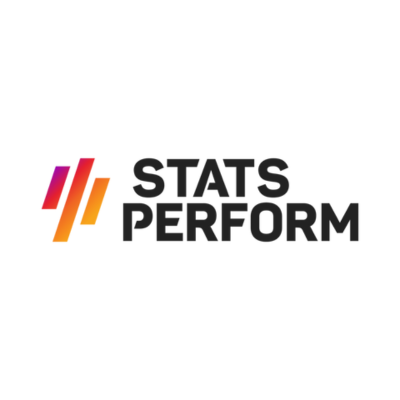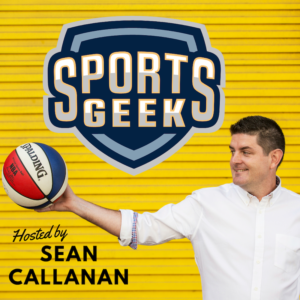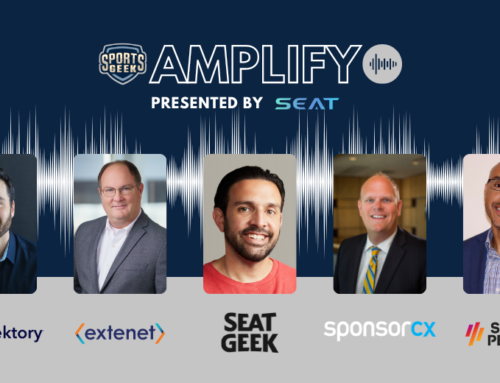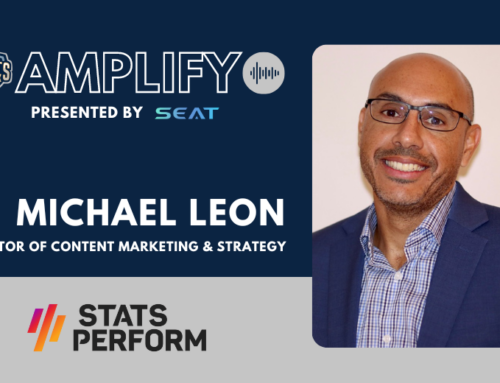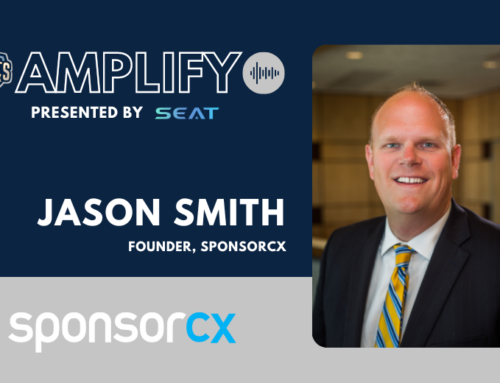SeatGeek offers a data-driven, user-friendly approach to ticket-selling with a native and efficient ticketing platform that can lead to a more streamlined, efficient and personalised fan experience.
Ticketing has long been ready for disruption. SeatGeek started on the secondary market and now can offer solutions across primary and secondary ticketing to optimise your ticketing solution.
In this Sports Geek Amplify episode, Jeff Ianello from SeatGeek shares the data-driven approach to delivering value for fans via ticketing.
What you'll learn from Jeff Ianello
We went live with the Baltimore Ravens, Washington Commanders and the Tennessee Titans a couple of months ago, and we did it flawlessly
Please be kind. Transcribed by bots may contain some errors.
Sean Callanan (00:01.666)
Welcome to the Sports Geek Amplify Series presented by SEAT. SEAT will be at Salt Lake City July 14, 15, 2023. You can register at seatconference.com. This episode will feature SeatGeek. I know that's a lot to take in, Sports Geek, SEAT, and SeatGeek all in one episode. Very happy to welcome Jeff Ionello, he's the Head of Sales North American Executive President at SEAT Geek.
Jeff, welcome to the podcast.
Jeff Ianello (00:33.666)
Sean, thanks for having me. Really appreciate it. It's good to be here with you.
Sean Callanan (00:37.302)
No worries, before we dive into SeatGeek, I wanna get a little bit of your background and your ticketing background. How did you get your start in sports, but the field you're in now in the world of ticketing.
Jeff Ianello (00:52.11)
So I am a story like many, many others coming out of college where you were trying to get into the sports space. And I knew at that point, which put me maybe a little bit of a bump above others who were trying to figure it out, that I wanted to be in sales and I wanted to be on the revenue side of the business. I graduated UMass in 2002 and then became a ticket sales rep, an inside sales rep at the New Orleans Hornets at the time. People are going to in 20 years really mess up this Hornets Pelicans thing.
And then shortly thereafter, shortly thereafter, went over to Phoenix in January of 2003. And I was there throughout really the growth of my career for about 11 years under Rick Welch first, people like John Walker, Mike Tome and Drew Cloud, and others that really believed in career growth and was able to be fortunate enough to move up from an account executive to our SVP running ticket sales and suites and service there.
Sean Callanan (01:22.176)
Okay.
Jeff Ianello (01:50.57)
Before going to the NBA team both for two years and then joining Seakeak gulp almost eight years ago now Which is really crazy to think about what a what a blur this has been It's been super long and short at the same time. However that that makes no sense, but it feels that way
Sean Callanan (02:06.862)
No, that's all right. That time does seem to go faster when you get older and then it seems like it didn't take that long. But obviously the ticketing industry has changed a long time from those early days of inside sales of the Phoenix Suns to then working on ticketing strategies at Team Bo. Like seeing what teams are doing in different spaces. What was the draw of SeatGeek going from team side and then working at the league?
at the NBA to go, hey I want to work with Seatgeek.
Jeff Ianello (02:40.014)
Yeah, it's a great question Sean. One of the things that makes us unique and special is DNA slash people. We're unique in that way that we are built by two technologists and business analysts who coded the first version of Seakeak out of a coffee shop in Boston in 2009. And what I was looking for and what really attracted me is hope, inspiration for what could be better in the future, and FOMO. I didn't wanna miss out on.
what I believed would be something that would be transformative for myself and peers. And I'm somebody who was driven by best practices. One of the reasons why team bow was attracted to me at the sons and why I was attracted to team bow was I believe I was fearless. I was an innovator, somebody who was not scared to put things in practice for the first, for the first time or one of the first. And I wanted to drive that. We're at this 15 year period plus ish of amazing technology Renaissance yet.
it's 2015 and ticketing looked a whole lot like it did during the Reagan administration. For somebody who wants innovation and best practices, you kind of shrug your shoulders and go, well, I guess it's just going to be this way. Then I met Russ and Jack and some of our investors on board and the world changed for me. At that point, I wanted to not be political, not be fearful, go in, make something happen and really drive us into the future.
Sean Callanan (04:01.05)
So you spoke a little bit about the SeatGeek origin story of built out of a coffee shop and being a new player in the ticketing game. What was that genesis, that initial piece, and then how has it evolved in your eight years?
Jeff Ianello (04:17.79)
Yeah, it's like, it's one of those romantic tech stories where you have Jack and Russ who are college roommates in Dartmouth and they start a furniture rental company and join consulting firms and hate it. So they quit and then they go meet at Espresso Royale, which I think is called something different in Boston. I have a lot of friends there. It's a great, great city. And they meet at Espresso Royale and they bring new ideas every day.
And it was during this Boston sports Renaissance where they were both sports fans. Both music fans were like, man, why is it so hard to buy a ticket? Why is it so difficult to understand what price to purchase at and what a, um, and what site to buy on. And one of their inspirations was a guy named Steve Haftner, who was also a Dartmouth graduate who is now and was the founder of and CEO of kayak. So if you remember back at SeatGeeks for several years, we were known as the kayak of ticketing.
Sean Callanan (05:10.401)
Okay.
Jeff Ianello (05:15.234)
but they took some inspiration from Steve along the way, who's now a current board member, and they created a pricing site. Let's help you figure out which site to buy the best price on, and then from there, decided to bring all the sites in and be a marketing arm and grade them and figure out where you should buy at if you're a consumer. And then we moved to a direct to fan shop a little bit before I joined in 2015, but everything around, and there was around the premise that
This is too difficult. Why is it that way? Like this is one of life's great life affirming moments. One of the greatest things you'll remember in your entire life. If you think back to your top 10 moments in life, and I'll challenge our audience here to close their eyes for a minute, hit pause on me and think about the top 10 moments of their life. I bet once they go past family or kids, they don't go very far until they hit a sporting event, concert, a show with people they love.
And it's the best moment of life yet. This initial experience is wonky. It's clunky. It's, it's annoying. I mean, we've seen that even this year with some of the things that have happened. And like, it just needs to be better because we're doing an amazing service for humanity. And that's, that's the basic premise. Jack and Russ started with in the, really the baton that we all carry now for, um, for this, this battle between good and evil and hope and fear. And that's, that's where it started.
Sean Callanan (06:42.67)
So very much coming into the space as a disruptor and into a space that needed disrupting, and again, coming into tech as there was a lot of disruptors in market. People were dropping taxis for Ubers, and there was this real need and people wanting to look for a new solution, and yeah, ticketing was one where there was still debate on do we print tickets?
How do they get distributed? What's the most effective method? And then there was also that data renaissance on the team side and on the league side. It would be something that you were always fighting with when you're at the Suns and even at team bow to go, how do we get better information on our fans? And that was really hard when you would be selling the paper ticket once and then it would change hands four or five times and you wouldn't actually know who was in the stadium. How has…
I mean, having that fan focus and that technology focus given SeatGeek an advantage in how the product has evolved.
Jeff Ianello (07:50.582)
Yeah, it's everything. Teams, as you mentioned with a few of your examples in there, Sean, we're not trying to sell a ticket. We're trying to grow fandom. We're trying to engage our audience in a variety of ways. And that's on the mobile phone, that's through TV and somebody watching games through your provider or your streaming service. That's with all the different experiences we have with the fans when they're at the venue. But the venue and the purchase experience is only one thing. But we're trying to develop a one-to-one relationship with that fan.
and ticketing and the ticketing companies are a vehicle for that. When you have a vehicle, you want it slick and smooth and sexy and easy to use and something that's fun and engaging. And while I loved, I loved the brand, we were like a 1985 accord for in ticketing for about 20, 30 years here, right? Like it's 2010, 2015. And we're like, we're, we're, it's like my old Buick I drove in, in, in high school. It's clunking around here and I'm trying to soup it up, but
you know, with a whole bunch of plugins, but it is what it is, right? You can't put lipstick on a pig. And what we view ourselves at is a vehicle, really a platform, a growth platform based on true technology and bi-weekly releases like a tech company to give the teams and the leagues and all of our properties the ability to communicate with their fans in a variety of different ways.
Sean Callanan (09:12.218)
So from a product point of view, from SeatGeek point of view, it has evolved and there's probably still a lot of people in market, whether they be the end consumer, the fan, or even people in business like some of the attendees that still see SeatGeek as a secondary ticket market sales marketplace where, oh, this is where we go and I can't get tickets to this game or I can't get tickets to this concert. But like you said,
because you've got the technology, you've evolved and you're not just secondary. So do you now have a couple of different elevator pitches for what SeatGeek is to explain the different facets that you now provide?
Jeff Ianello (09:52.254)
Yeah. I mean, our mission at Seakeek is to bring the world more live, to help the world experience more live. And we're doing that through natively built, elegant products. And I think that's important, right? Elegant, easy to use. Native, one of the problems now with legacy technology is that it's so not nimble and can't have the full features that you start to have to rely on a growing number of third parties to plug in and fill the gaps.
sports properties. Really, they're huge brands in the community and iconic brands, but they're all small businesses. If you think of the non-sports side, 100 to 300 full-time employees in some form, that's not a huge business. And you want to be able to drive efficiency. When you look at where we launched, which I was there for the launch of Seatik Enterprise or our primary, what we call, full-stack product back in 2017 with Sporting Kansas City to what we've been able to develop now.
the rate of change in the development cycle and how much is native is really inspiring for the space. So, I mean, from a pure nuts and bolts product standpoint, I oversee the sales business in North America for what we call full stack, which is primary, secondary pricing and other features on it where we go in like we do with the Dallas Cowboys or the Cleveland Cavaliers or FC Cincinnati and we power it all. And then there's other services we offer. We have inventory and pricing services.
If that's an emerging space we're proud of, that is for a property that has a relationship with a primary and secondary provider, but wants to help sell and market and acquire new users. And we do integrated partnerships with like-minded properties to expand the brand. So we're really, really proud of our recent partnerships with Major League Baseball. We're the league's official secondary marketplace. And we're able to integrate with all of the teams and
of integration. What most people don't know about that deal is that baseball's also helped the entire ticketing and fan community by having a verified program with other secondary marketplaces to try to solve the problem of fraud. We're also really proud of our partnership with Paki Olin and Kim Dameron and the way that she looks at fan experience in that program of bringing SeatGeek to all of Paki Olin's colleges with our secondary integration there as well. So we're trying to get SeatGeek in front of as many people as we can.
through growing our offering and really elevating the business. When I joined, we were about 150 people. Now we're over 800, and we're booming in a unicorn company. So it's very, very exciting.
Sean Callanan (12:30.29)
So being a sales guy, you're not often saying no if someone says, hey Jeff, can you help us? But you've also got the ability to say, hey, I've got all these facets and different products that can help. If you've already got a primary ticket provider, we can be your secondary ticket provider. If you've got both, we can help in between. Because your technology, it's all API. I'm a former geek, it's just how do you plug it in? And I think that's been one of the blockers in ticketing.
the plug-in ability, if I'm making up words now, that ticketing needs and that's sort of something you're looking to do. But I think what I wanted to just sort of dive in is some of these customers that have like leant into the disruption and said, hey, we do want this full technology stack. We do want SeatGeek to be selling our primary and managing our secondary. Is there, has there been something that's
definitely brought them to them as particular reason or why. If you can sort of dive in one of those use cases to say, hey, why did they come to you and what were some of the nice outcomes of being able to manage the full process?
Jeff Ianello (13:43.806)
Yeah. I like to share people, there's several ingredients that go into a successful partnership or a partnership that happens versus ones that we don't sell or maybe isn't as successful. Some of those ingredients include one, you have to believe that the current ticketing environment is not great. It should be better. And the second one is you have to have value in seeking, not just being a utility, but really enhancing.
that fan experience, our fan facing dominance in the space, which is, there's data to point to that with less fan friction, higher NPS scores that we have. There's value in that. It can't just be about economics. We've made a monopolistic driven category that was depressed into a category, but now we frequently get outbid candidly on deals. It has to be strong commercials, but it can't be buying a deal.
And there has to be a willingness to have a staff under you that isn't going to try to disrupt in a negative way and not change. There's a lot of change resistance when it comes to ticketing personnel and IT and finance. And there has to be that real vision there to be able to change. And there usually is one singular bold executive that says, hey, this is us. This is our DNA. Come with us.
And that's to their internal team and follow me and you're going to be safe. The example comes to mind with a number of them. Nick Barlish with the Cavs, Jake Reed, who was our first, really our first client sporting Kansas city, who we had no, it's crazy to think we had no real product and we were building it as we, as we went with acquiring a ticketing company and you know, he said, no, this is better for our fans, like come follow me staff and we're going to make this thing happen and those expectations made it successful and Chad Estes, who is somebody who is a
mentor of ours and is the head of business for the Dallas Cowboys. You know, he told me when I checked in with him a few months ago, Hey man, like five, six years ago, we were, we were a little bumpy at the early phases. We didn't have features built yet. Then it's our DNA. We're no fear. We're about our fans. It's our culture. You know, we left Coke for Pepsi. We did, we know we did things that were disruptive and it's just who we are now.
I think that that permeates itself to be in a number of ways. If you want something better in pricing, we could do that for you and it helps you sell inventory without switching the whole thing. If you want to be part of a disruption by being part of our integrated partnerships, we bring that to you as well. But if you want the whole kit in Kaboodle, we of course do that. We believe we objectively do that best in class and true believers. That's what we want, true believers in this space.
Sean Callanan (16:29.334)
And so those true believers, are they particular? Because ticketing isn't as simple as talking to the ticketing person and saying, hey, cool, we'll roll it out. Because it touches on so many facets of the business. Like you said, you've got to have IT integration. There's potentially things around the venue. The data and analytics and the backend and the data geeks are involved because they're taking data feeds from different places. It's not.
it's not a simple, you know, taking a CD, putting it into a server and saying, cool, we're ready to go. Finding those, who are normally some of those champions from a role perspective, and then who are some of the key execution people that come along for the ride and then realize, like, have to go through that change, because again, ticketing is something, this is how we've always done it, and it is something that…
you know, requires change and a mind shift. But who are some of the people that you work with in an organization, you know, from a role perspective that might be listening or they might say, oh, hang on, I better pass this on to that person in my organization.
Jeff Ianello (17:41.222)
it could be anybody like candidly, if, if you believe there should be a change and you're a ticket office person or you're a head of sales or you're a president of an organization, I'd love to talk to you. And I think those conversations are inspiring, even if that's ultimately not the person that that brings everything along with them. If you take a step back and you go, how do our, how do our partnerships happen? They're typically in the full staff partnerships, which, which we sell like the Cowboys.
like sporting Kansas City, like Austin FC, like these partnerships are six to 18 month sales cycles, very, very long sales cycle. They are typically driven by a business decision maker. So a CRO, a head of a department, a team president or CEO is driving that. But there is participation, as you mentioned, Sean, across many people, your heads of ticketing, your heads of ticket operations, IT.
Business analytics is critical. They're usually a much more progressive thinker and want something, want something more out of the space. So they, they come along as well. And then you have all, really all the organization, even after ownership, it's such a interesting space in the U S. Um, and those are, those are decision makers that, that play a part of it. And on my side, it's not just me or one of my salespeople. It is our solutions consultants who were sometimes commonly known as sales engineers, they're that voice and intermediary who come in after our initial story.
And they will work with a variety of teams. They'll map what integrations are actually taking place now, what features and functions are vital to that organization. Then we'll come back a few weeks later and we will show them what we call a vision match, which is really a technology vision for the space. And how we have changed is noteworthy as well. And over the past year, year and a half, we have some properties that come in and they're fishing around for money, fishing around for a check, where we have experienced some
you know, early ticket ops resistance and some, you know, candidly, pretty rude and inappropriate behavior in early pitches. And we've just told those properties that we don't want to participate anymore and we want to be very serious, selective with our, with who we work with and that usually leads to a really, really good partnership down the road. Um, and I've decided to walk away early in those conversations. Our con our discussions have to be tech first and they have to be DNA alignment. First, it is indisputable that we bring the bat.
We will bring money and we will spend money if it's a good fit for us. But you've got to, you've got to bring the belief and you've got to bring the technical alignment for this to be a good fit. And that's why we've adjusted and how we lead our sales process.
Sean Callanan (20:14.946)
And is it really like you were saying before, it's more a mindset than just looking at ticketing as a revenue channel to say, we want to know our fans well. And so that's the focus. We want really good data and data will help us better serve our fans and expand our customer experience from in the stands to the digital customer experience, which is becoming more and more of a focus for more teams and realizing that data is the oil that unlocks that.
that becomes the focus. And then the revenue flows from that because you've got fans having more fun turning up, like you said before, having more of those experiences. So it's either that data phase or that just that pure fan piece of needing to better understand what their fans are doing, making sure it is easier, having the problems of having too many staff dealing with too many ticketing requests or too many complaints and too many customer services. Is it really?
become that mindset piece rather than one provider coming in is another provider coming in and it really just changes a one or a zero in the balance sheet and it doesn't really move things for the organization.
Jeff Ianello (21:27.21)
Yeah, just the one or the zero or the two or the whatever it is, it never works. Like going in and putting your name on something. It sounds like a good idea to begin with and a shortcut for both sides, but it never plays itself out into being anything that actually consummates as a zero-sum game. And what I would say is those ingredients I mentioned before and that true belief is paranoid that's core to it. But then we have to show if you believe that if you close your eyes and look four or five years down the road.
And you believe there is a future vision for the world of ticketing. And you believe in our story and what that is. Then you have to believe that we're the best company to take you there. We believe it's all of those things and more. That's why the sales cycle is so long, Sean. The, the fundamental ingredients are DNA and people, and then our belief of how we innovate. So being a data and a, um, almost a research arm first in talking to our clients, talking to the fans.
through survey, through case studies, through focus groups, really understanding what's important to them and then building products that relate that, testing those products, making sure they convert. And then through that, you really build fandom by those great products that you build. You build that one-to-one connection, whether that's us building native exchanges or upgrades or bucketing flex plans, or really our product that we are most proud of at this point is Rally, which is a one-to-one fan experience platform.
where I could speak to you as a super fan differently through your ticket, or I could speak to you as a family of four differently. And what we're trying to get to is becoming a platform for all of our clients to speak to the fan one-on-one. And to have such an easy to use, elegant program, that it's so easy for the fan to transfer, they are capturing more names. You capture more names, you speak to those names individually, you build and you grow fandom. That is an inspiring story for most. If you believe it can be, you believe it could happen, we'll show you why we're the best company to bring you there.
Sean Callanan (23:26.274)
And is part of your advantage in, you're always looking for change and benefits for a customer and you're having that product focus, whether it be a product for a fan, whether it's like you said, a new type of ticket. But we've got, if you go back to your Phoenix Suns days, the ticket, the fan market and the fan behavior and the ticketing is so changed. I'm sure when you're inside sales,
you know, trying to get someone to a game and then get them onto a season ticket plan and then cool, lock them in and then cool, where am I gonna go find the next one where, you know, now we've got a new generation that, you know, has grown up with Uber, has grown up with On Demand, who just wants to go when they want to go. Yes, they might become season ticket holders, that's sort of the goal, but they also might not. And so you've got to keep developing different products. And so you workshopping those type of different products and finding, you know, what's working for the Cowboys.
might be working differently for Sporting KC, but you've got the ability to pull in some of those modules if you like getting in full tech mode. How does your sales team work with your tech team to say, oh, this is what the cowboys need, and this is what Sporting KC needs, and this is what the calves need. How can we bring that out? Is it a new feature? Is it a new ticketing product? What's the kind of cycle on that in keeping the…
keeping SeatGeek as a product and as a platform fresh and always offering new things for clients.
Jeff Ianello (24:58.262)
Yeah, it's a good question. You touched on it before about the changing demo of the fan base. Brings me back to two Thanksgivings ago. I'm here with having friends Thanksgiving because of COVID and my two little kids come in with their little friends from the other room and they go, daddy, daddy, daddy, can we play Roblox? I'm like, yeah, sure. All the parents are here, we're having a cocktail and we give them their tablets and they proceeded to be like completely silent for three hours playing Roblox. And I'm like, wow.
This is a whole lot different than my Thanksgiving back in the 80s when I was seven and six years old rolling around the mud outside. When you look at some of the data and you're a property, that's a little scary. The way that Gen Zs and now who they are, which is alphas, are consuming content. All the stats that you see, I mean, one that is, I believe Morning Consult said that 47% of Gen Zs in the survey have never watched a pro sports event.
Sean Callanan (25:30.619)
Yeah.
Jeff Ianello (25:54.994)
I mean, this is like mind boggling, scary stuff. So we have to be better digitally. We have to engage more thoughtfully and whoever has tools that can evolve with that and arm your teams with those tools is going to win. Like our belief is yeah, it's, it's different, but just a bit more complex. You're trying to find, you're trying to nurture more and find handraisers out there with the types of tools and technologies that you're doing. You're trying to speak to one-to-one with thoughtful messages on that. And
You know, how we actually decide to build products are through those data and insights and all the research we do. We literally have a department that is dedicated to doing this, speaking to our fans, researching fans, doing surveys, bringing that data and sharing with our teams. And then we have, Sean, a client advisory board. What most people don't know is we ticket 50% of the Premier League. We have 10 of the 20 clubs now. We've grown that dramatically. We bring folks to Premier League, to Jamsden Theatre Group, which is Broadway.
um, folks from our us pro sports teams and they look at this data and they look at all their different priorities and we work with our product team and product managers to really craft a roadmap for the short and long term and they decide amongst themselves with our team. This is refreshing because not that the other legacy ticketing companies and the largest one, one don't want to do that. I'm sure they do. But when you have really, really old technology that was built in the Soviet era, it's really hard to develop and craft products. So.
Why even try for not losing market share? But that is how we decide is by researching, fan sharing insights and then innovating based on that feedback from our client advisory board and beyond.
Sean Callanan (27:31.746)
And now you also, as stadiums change, and especially to cater that new demo, 15 years ago there was never a ticket for, hey, just turn up and stand near a bar and there's gonna be a game of football or basketball behind you, right? And it's like, what would that ticket be? I'd be, oh no, no, you have to buy a ticket in the top bowl, but you can stand in this bar. And that's, you know, because it was really, it's like, no, no, you have to have a seat. You have to sit in a seat, but like now we're getting,
you know, stadiums being built that are, you know, part nightclubs and not stadiums at all, you know. And so being able to say, yes, we can turn on that ticket, be able to sell that ticket, you know, set a capacity for that ticket, is again, those things that you're adapting to as the needs of both the teams, but also as these stadiums start changing to say, where does this ticket get me? And like you said, it becomes a utility,
you're still scanning it in different parts of the stadium to know which area that you can get into.
Jeff Ianello (28:36.418)
Yeah, it's a really good point. If you look at where Seek Eats UX was on a single purchase primary or secondary perspective seven years ago and where it is now, it's unbelievable the change and the amount of copy and entitlement info that's there and still easy to use is really inspiring. One example is Lisa Manning who runs, really leads all fan experience in marketing for the Cardinals and Steve Ryan who oversees business development. We talked about this early.
in our partnership and ideating what that could look like. If you look at that experience, you can now really filter down from the mobile phone into 50 yard line, visiting and home team sidelines. There's a number of information of what the ticket includes. You can now purchase upsell products and you can really create your own and build your own experience in your own fandom. If you can do that, you're really guiding the fans to have a better, more memorable experience. And you could activate that on an event day through rally.
where you can guide them into a better parking spot or entrance by sending them message based on what you know about them and where they're sitting and where they're gonna enter based on the side of the valley or the area of the valley, West Valley, East Valley, North South. You can direct traffic in Ingress and Egress. You can display things that are happening around the campus, so to speak, of the NFL stadium and really guide people almost like wayfinding towards that cool, fun.
interactive experience that's right for them and that's the information we're trying to bring pre and post purchase experience to the fan.
Sean Callanan (30:10.266)
Terrific, terrific. One of the things that I'm always asked when when clients are saying hey, can you assess a product? I apply what I call the triple threat and look at three different things Because a lot of people come and say hey, this is my product. It does all of these things We've got all the bells and the whistles And they're trying to figure out exactly, you know, will it work? Will it work for them? The first one I always look at it is it is it a time saver in what way?
If a client takes on SeatGeek and everything is on boarded, how does SeatGeek clients claw back some time? Most, like you said before, most sports are small businesses. How do you help them claw some time back so they can start focusing on other ticketing initiatives or other marketing initiatives or making sure that they're serving some of their customers better?
Jeff Ianello (31:02.826)
Yeah. And you hear this sometimes, well, we sell out anyway, and we're a big team. People want to go to our team. They'll just figure out a comm ticketing is a utility. Um, I obviously believe that's not true. I'll give you one of the biggest examples of Dallas Cowboys. Um, they really don't have a lot of trouble selling tickets, candidly, or selling out their stadium, right? But if you think about what we have brought to them in the first year, this is pre COVID, we increased mobile entry by like,
92%, some absurd amount. And when they tracked customer service issues, we dropped it. They doubled mobile entry, and we dropped consumer issues by 92%. 92% less issues. Doug Dawson, who runs ticketing for them, thought their phones were broken because there was so few calls and voicemails on a game day because of just how better and more efficient and effective our product use.
And then another way we are a time saver is if you have to use less third parties, because we're more native, because more effective and we work smoother and we're easier to use and people want to use it, then you're going to get less phone calls. You're going to get less complaints. If we have more, um, real estate on our platform and we're easier to automate and activate for marketing and business intelligence to send messages to fans in a variety of ways, we're making it easier for fans to consume and less cumbersome on a blocking and tackling or manual input, things like bag policy.
or where to enter the venue. Those are big time savers when you think about it. It's over 20, 50, 100,000 people.
Sean Callanan (32:38.098)
And the really important thing there is even I when I was asking the question I was thinking it from the ticketing staff point of view and every single time saver you just gave was a non ticketing staff You know result and so it's back to that, you know, if it is someone in ticketing or revenue That's that's driving the change, you know selling those benefits of you know Less hassles at the at the gates less hassles pregame with people calling asking about their tickets those kind of things It definitely does add up
And then, you know, those customer service people can be deployed in different places doing, you know, everyone loves to do the surprise and delight, but there's, you know, they're always stretched to all parts of the stadium to put out little fires everywhere. So it's a really good point to say, you know, yeah, go.
Jeff Ianello (33:22.251)
Yes, it's-
As you see, I get excited about this topic. It's fascinating our data and insights that so many consumers say that a barrier is just the anxiety over ingress and egress, or not being able to know the campus very well or the arena and not being able to plan. If you can provide them with tools and comfort there, can make the experience better. If you're getting people in and around faster, it's better. Like if, and they'll come back more, FC Cincinnati.
We doubled the amount of parking passes sold online. That reduces the amount of people who have to go in and get cash or credit card there, and it speeds everything up. By getting, almost creating a control panel to direct folks in when the New Orleans Saints and Mike Stanfield were trying to work around this massive construction of Caesar Stadium, they created and automated.
about 110 different messages that were automated on our platform to different users based on where they're sitting to direct where they enter and exit the venue to make it an easier experience. And that's what really, really forward thinking native technology can do. You can plug rules in our systems based on a rules engine, plug those rules in, and then have the copy and have the creative spit out based on the rules that you enter and thus trigger a better fan experience.
Sean Callanan (34:47.23)
And the part that's really important is, you know, again, the changing fan demographic, you haven't got the same person going to those, you know, 41 games or, you know, those eight games, if it's the NFL, you still have those Russodons that go in and they know where they go. You're always gonna be having these new fans that are coming to your venue for the first time. And so that experience is critical because they don't know to go to Gate E or to head to level three.
So it's a really important one. The second one in the triple threat Is money, you know, I'm not going to go fool Jerry McGuire here But a lot of times teams will look at and go, you know, show me the money How do you go about saving us or making money and that's pretty much most you know, most the time when I'm looking at technology It's like You know, how do you help save money or how do you help make money? You've already just already spoke about it's not the key focus. It's not the driver. It's not the way you walk in
But what are some of the budget efficiencies that you come using SeatGeek in, in either the full stack model or in multiple pieces? And then the other piece is, are there some nice revenue uplift and some nice little surprises once you start getting the system moving?
Jeff Ianello (36:03.906)
Yeah. And to clarify, Sean, we don't come in with a, here's a big upfront cash or a check and this is the way to do a deal. And let's sign in a week. We want to go through that diligence process that we talked about and really understand their business and grow. Now we do think we bring strong commercials. And to the question you just specifically asked, there is a number of ways that we have actually increased ticket revenue and driven data. One, when you go with Seakeek, your transfers and the amount of data that you collect go up. If you're tracking,
long-term value of a consumer and the new consumers require, we drive more because it's easier to use. And I don't think anybody would dispute that, right? Like if you look at Seakey, can you look at the other guys? It's pretty clear to see who's got an easier UX. A team like the Dallas Cowboys, we've driven really about $3 million plus in the past year of revenue, ticket revenue efficiency for them. So like more revenue sold on a ticket based on pricing better and more thoughtfully, scaling.
As I mentioned before, we're known for our UX, but how we've really created this army of data scientists that can go out and test pricing, fees, combinations of display and what converts, literally in a sellout situation for most of all of their events, even third party events, we've driven seven figures plus of real revenue for a team that sells out. Our belief is that through that, data capture, all the add-on products I mentioned before,
it adds up to a pretty significant lift. And then if you factor in the satisfaction and how our teams are typically the highest NPS and are typically the highest teams that are surveyed by leagues, you have to believe that there is that effect. You were trying as a team executive to enhance the fan experience everywhere else, but you wouldn't want to enhance it here with some clear objective data and just being able to have
like the trade of eyesight, right, is being able to look at the products and believe that it's going to help your fans. That's what I would say to your question.
Sean Callanan (38:13.754)
And do you think, I mean, having as much of the data picture that you do, you know, and again, if we look back 15 years ago, 20 years ago, you know, dynamic pricing was a little bit more, you know, shot in the dark. Oh, the Cowboys are playing a big rival. We'll put the price up. Do you think now you're getting to that point where you're getting all the information, you know, the usage of the tickets?
the demand and getting that pricing right, both in that first, in that primary market, but then understanding the data coming from the security market, and that's where a lot of that revenue uplift is coming from with some of your clients.
Jeff Ianello (38:51.854)
I think both primary and secondary, if we have so much data and we're able to work with the teams to help really score, but real time score, those fans and who's entering the site and how we price in certain areas and how we scale the building, it all goes into the formula. Even as simple as how we created a product called Swaps, which allows somebody to purchase a ticket and then typically return within 72 hours of the event. We know that if that Swaps logo is there, it converts much higher.
So like that in and of itself, if somebody has the ability of flexibility should help more in a higher price. If the conversion is gonna be a little bit higher and they have that flexibility, you're in essence paying for it and creating some satisfaction. And an alternative if somebody can't make it, you're still serving that fan and help bringing them back the next time and growing fandom.
Sean Callanan (39:42.806)
And so the last one from a triple threat is a resources point of view. Normally, you've done the onboarding and rolled out the platform and is now, Seekik is how you're selling tickets or part of the solution. What's the impact on key staff that end up using the platform? What does the onboarding look like? And then how do you've got to retrain?
get those staff that have been using a different system to be using SeatGeek. What's that process like and how have teams adapted to that?
Jeff Ianello (40:21.734)
Our belief is that we are objectively a boutique blue chip service company now, much different than where we were seven years ago. It was, okay, we sell it. There's something that's going wrong. Call Russ, call Jeff, call Katie. It was like three of us that did everything. Danielle Datois, who is our president on the enterprise side of the company, she came from Salesforce and she really built out a elite services org, but we're still learning every, every year we've gotten.
from even deals that we did last year to ones we recently launched. We went live with the Baltimore Ravens, Washington commanders and the Tennessee Titans a couple of months ago, and we did it flawlessly. And the reason we did is because we put a person on site and we found and discovered that even if you're doing great training and you're going great through implementation and you have resources, having somebody who's a combination of on-site and remote dedicated to that team.
to help the power users and operators feel comfortable to transition. It's such a great financial investment in what is a massive partnership. And, um, worked really, really closely with, with people like Jason Wright and Tashi Brown and Burke Nyhull, who were the president of those clubs. And then really sat down really, really in detailed way with folks that are on the ground to build out a plan to make it successful. And it's something we're very, very proud of, but you have to, you have to have enablement, you have to have training. It's a very, very big switch at the user level.
for someone who's never used a different piece of technology in 20 or 30 years, which has really been the problem in this space. It's, I mean, it's a huge deal if you switch something you use every single day, be it a CRM system or a, um, or a, um, mobile phone, even if you're, if you're a, just as a consumer, if I switched from my iPhone to Google, they're both great, I'm sure, but it'd be, it'd be an adjustment for me at the onset. And that's, and that's what it is for these power users. And we, we want to make sure we make the investment in
equipping them with the resources. So you have an account manager, a more dedicated marketing services person, somebody who is implementing it, who is a combination of onsite and remote, and then what we call a CSS, somebody who is really there to be that blocking and tackling operator with you side by side through that first period of time.
Sean Callanan (42:38.214)
But I'm guessing your customer service people are also, those end users are a big part of the experience. And so some of those, as much as you're doing all the changes for the evolving stadium and the fans and we want mobile ticket, you also want that experience for your internal users at the teams to be able to have a system where they can pull the data they need to pull, run the ticketing campaigns they need to run.
automate the marketing messages they want to market. So I'm sure as much as we're seeing changes on the marketplace side and the SeatGeek tech from a fan point of view, the business point of view is also getting those changes through to say, hey, Jeff, our team wants this, or we need these feeds, or our team would like these kind of things. Changes are happening in that backend as well for the backend staff.
Jeff Ianello (43:34.538)
Yeah, our back end is called Unifi, our enterprise piece of software. And we literally rebuilt it over the past three years. And if you think about where we were from a consumer standpoint and where we are now, and you think about where we are from a back office standpoint, feature set wise and UX wise, we believe that to me the back office features have grown even more than the fan facing one, which is dramatic. If you think about some of the other legacy systems in the space and what they looked like in…
2007 and 2016 and what they look like now, pretty darn similar. Ours is night and day different. It's the biggest area of growth we've had and it's driven unbelievable user satisfaction. Deeply personal for me since I was a back office user. I was a sales rep, a leader of sales. I worked with and around a lot of these folks that we sell to. They're my peer group. I care about it. I want to do the right thing. Our team and our company and our culture is about doing the right thing.
And that's why the resources and financial investment has been so massive there and we're proud of it.
Sean Callanan (44:37.846)
Well, Tarroui, this is where I would implore people who are listening to come along to Seat. Go to SeatConference.com. Hope to see many of the people I know in the digital and data space and ticketing space, so come on down. Connect with the SeatGeek team. If anyone comes up to me and says, Hey Sean, I listened to the SportsGeek Amplifier series presented by Seat. I really enjoyed the conversation with Jeff from SeatGeek. I will buy you a beer because that's a tongue twister.
But if you reach out to me, if you want to find anyone in the SeatGeek team, let me know. I'll point them your way. Jeff, there's going to be a fair crew at Salt Lake City. You'd be happy to have a chat with anyone at Seat.
Jeff Ianello (45:18.43)
Yeah, I mean, Jeff at SeatKey.com. There's no alias, no code. If you're the first Jeff, you get your first name. So I'm Jeff at SeatKey.com. I always love talking to true believers. This is a special conference and huge thanks to Seat and Josh Barney. Real Salt Lake and the Utah Jazz are two of our 16 new signings in 2022. So it's a special place and community for us. And we're so, so proud of those relationships and excited to see friends at the conference and talk about something that
that lacked before CK get here, which is inspiration. Like let's, let's get inspired by ticketing. Let's let's believe what it could be in five or 10 years. And if you, if you think, if you think that could be possible, we want to talk to you.
Sean Callanan (46:02.006)
Definitely, I'm going to wrap up. I'm going to do the Sports Geek pitch. This is where I'm going to present your pitch back to you after having this conversation. Hopefully, I get it right. It can be refined further at SEAT, maybe late night in bar, but I'll give it a go this time. You know how ticketing is an evolving landscape at a real tough customer experience? What SEAT Geek do is they help teams and venues create a great fan experience via a ticketing technology solution. In fact, they sell millions. That's right.
all over the world. So that's what SeatGeek is, and again, as I have sometimes been confused with SeatGeek, and I'm okay with that, I'm happy to hang out with geeks all the time. Jeff, thanks for coming onto the show. I will see you in Salt Lake.
Jeff Ianello (46:48.942)
So what's it? Sports geek with seat geek going to seat? Say it 10 times fast and record it and it won a prize.
Sean Callanan (46:54.166)
Exactly. Exactly. Exactly. Exactly. So you can go to Sportsgeekamplify.com slash SeatGeek. You can go to SeatGeek.com. Obviously, there'll also be links at SportsgeekHQ.com. You can reach out to Jeff, Jeff at SeatGeek.com. If someone mistypes and sends an email to Jeff at SportsgeekHQ.com, guess what? I will forward it to Jeff. And don't forget, go to SeatConference.com to register.
Jeff Ianello (47:17.622)
Hahaha
Sean Callanan (47:21.91)
See you in Salt Lake City. Jeff, thanks for coming on the show.
Jeff Ianello (47:25.752)
Nah, thank you Sean, it was a lot of fun. I appreciate it.
Listen to Sports Geek Amplify – SeatGeek episode now
See you at SEAT in Las Vegas
Join Sean at SEAT Las Vegas in June. All attendees will have the option to claim a discounted Pick My Brain session.


